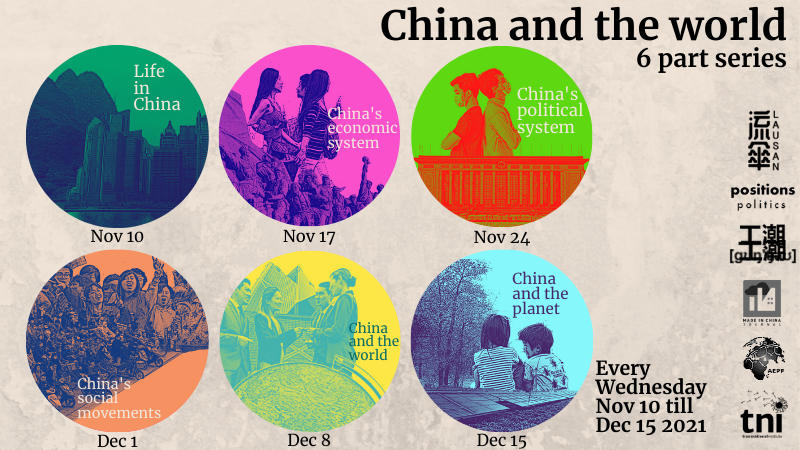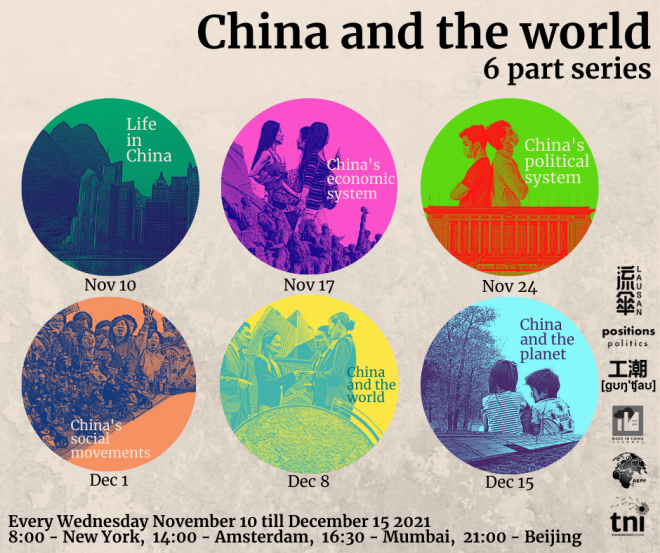China and the world webinar series
China’s rise in the last three decades has reshaped the global economy and politics. For activists and movements committed to social and environment justice, what are the implications for our struggles for systemic change?
China today has the second largest global economy, ranks first in outward foreign direct investment, has become the world leader in AI and a driver of economic growth globally. Global capitalism today would not survive in its current form without China’s dynamism and pivotal role. As the country’s wealth and influence has grown, the Chinese state is looking to consolidate power at home, while also playing a more assertive role within Asia and globally. This has led its global geopolitical role to be constantly scrutinised by outside commentators, most often in relationship to US power.
Yet China, despite its size and power, remains a state, nation, country and people that is little understood and poorly portrayed – most of all by mainstream media and politicians outside China. This is often a projection of the fears, ideologies and political interests of those outsiders, rather than an honest examination of China’s unique history, politics and peoples and their own struggles for meaningful well paid work, good education, quality healthcare, a clean environment.
To confront some of the mythologies, and also to deepen understanding of the country, Transnational Institute together with gongchao.org, Made In China Journal, Lausan, Critical China Scholars and the Asia-Europe Peoples’ Forum put together a six webinar series on China. It was intended for activists anywhere in the world who want to have a basic understanding of China’s political and economic system, its global impact and role, and the best ways to engage with the Chinese state, its institutions and corporations, and its communities and grassroots groups. The six week series was intended as a first introductory edition, and was concluded with a survey to decide on future webinar editions that could deepen learning, as well as possible spin-offs from the series including publications.
Sessions
1. Life in China, 10 November
What is the reality like for most working people in cities and the countryside? How has this changed since 1949 and particularly in the last 3 decades? How are people organised socially and how is this changing? What are the dominant attitudes on issues of gender, race and sexuality, as well as perceptions on globalisation and Chinese nationhood? What has been the impact of rapid economic growth socially and the rise of inequality?
- Dong Yige, University of Buffalo and currently working on book, The Fabric of Care: Women’s Work and the Politics of Livelihood in A Chinese Mill Town
- Eli Friedman, Cornell University and author of forthcoming book, The Urbanization of People: The Politics of Development, Labor Markets, and Schooling in the Chinese City
- Yutong Lin, Nomadic Department of the Interior research collective
- Moderator: Kevin Lin, Critical China Scholars/Made in China Journal
2. China’s economic system, 17 November
Is it capitalist or communist? How does it differ from US or EU neoliberal capitalism? What has it achieved since the revolution in 1949? What are its flaws? What can we learn from it? What is the current economic strategy? How does it fit into the global economy? Who are the biggest Chinese corporations, how do private and state corporations differ, and what relationship do business elites have with political elites? What is the relationship between Chinese institutions and global capital?
- Ralf Ruckus, editor of gongchao.org and author of The Communist Road to Capitalism
- Joel Andreas, UCLA and author of Disenfranchised: The Rise and Fall of Industrial Citizenship in China
- Others to be confirmed
3. China’s political system, 24 November (please note this is at 3-5pm CET)
How is China governed? In what ways is it democratic or not? Who has political power in China and how did they win and hold onto power? How is political power distributed or concentrated? How can we interpret the situation in Xinjiang, Hong Kong and Tibet in terms of understanding Chinese state power and political strategies?
- Rebecca Karl, New York University and author of China’s Revolutions in the Modern World: A Brief Interpretive History
- Darren Byler, Simon Fraser University and author of Terror Capitalism: Uyghur Dispossession and Masculinity in a Chinese City
- Yangyang Cheng, Yale Law School and columnist at SupChina
4. China’s social movements, 1 December
What are the main forms of social and collective organising in China? What space and autonomy do community organisations, independent media, academia and labour organisations have ? How do movements from below and resistance shape Chinese society and politics? How does this differ in Hong Kong compared to the rest of mainland China? How can movements based in other countries best work with and alongside Chinese movements and social forces? How can we confront Sinophobia globally?
- Au, activist from Hong Kong
- Manfred Elfstrom, University of British Columbia and author of Workers and Change in China
- Crystal L, Chinese feminist activist
- May Wu, social justice organiser
- Moderator, Ralf Ruckus, Gongchao.org
5. China and the world, 8 December
What is the Chinese state’s strategy in terms of its foreign policy, global investments, and its deployment of hard and soft power? What does it advocate for in terms of global governance? How does it mirror or differ to US or EU foreign policy? How can we understand the Belt and Road Initiative? What are the impacts of Chinese capital in Europe, Africa, Asia and Latin America? Are they any different to Western transnational interests? How can we confront the anti-China politics (or policies) and the threat of a new Cold War pushed by the political establishment of the US and other Western countries? How can we confront Sinophobia globally?
- Brian Hioe, activist in Taiwan, editor of New Bloom Magazine
- Lee Jones, Queen Mary University London, author of forthcoming book, Fractured China: How State Transformation is Shaping China’s Rise, with Shahar Hameiri
- Stella Hong Zhang, John Hopkins University and co-editor of the https://thepeoplesmap.net
- Walden Bello, Focus on the Global South, and author of China: An imperial power in the image of the West
- Moderator: Stephanie Olinga-Shannon, Transnational Institute
6. China and the planet, 15 December
What is China doing to address climate change and environmental crises? What is working and where is it failing? To what extent is climate & environmental issues being integrated into both its domestic policies and its foreign investments outside China? Are there any internal movements or forces that challenge an extractivist form of development? What openings and opportunities are there for change?
- Tobita Chow, activist and founder of Justice is Global
- Isabel Hilton, founder and senior advisor of China Dialogue
- Ying Chen, The New School and co-author of Global Green New Deal: A Global South Perspective
- Moderator: Nick Buxton, Transnational Institute




